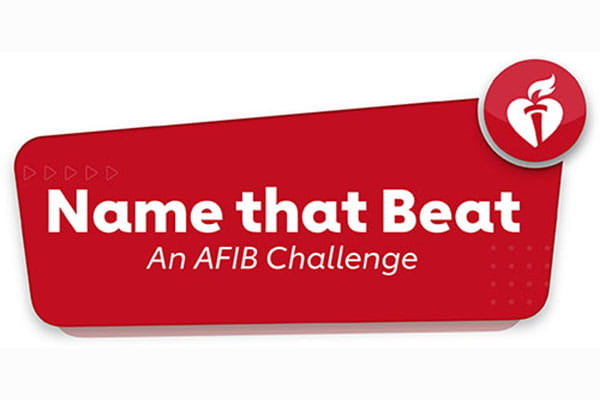Improving Outcomes in Patients with Atrial Fibrillation
Atrial Fibrillation Incidence and Prevalence
Cardiac rhythm disorders are common, with atrial fibrillation (AF) being the most common form of arrhythmia.

Cardiac rhythm disorders are common, with atrial fibrillation (AFib) being the most common form of arrhythmia. Do you know the four pillars of atrial fibrillation management? Do you know the prevalence of AFib or the clinical significance and associated risks with AFib or the benefits of rhythm control vs. rate control? Test your knowledge and find out with this fun and engaging game.
Enduring Webinars
Improving Outcomes for Patients with AFib
This case-based presentation is designed to provide learners with the evidence and knowledge they require to incorporate guideline-based care and new research findings into their management of patients with AF, including the appropriate use of rate and rhythm control options, anticoagulants, anti-arrhythmic drugs, lifestyle approaches, and non-pharmacologic therapies, as well as understand ethnic/racial differences in outcomes for AF.
CE and MOC Credits Available.
Lifestyle Modifications, Screening and Remote for AFib
This live webinar is designed to examine important evidence-based strategies for screening and management of atrial fibrillation in clinical practice. Specifically, current evidence and knowledge gaps concerning lifestyle management, screening for atrial fibrillation, remote monitoring, and treatment of special populations will be discussed.
CE and MOC Credits Available. Approved for 1.0 AAFP Prescribed Credit.
Rhythm vs. Rate Control in AFib: When and Why
Learn the benefits of rhythm control vs. rate control in your AF patients. Apply the evidence as experts use case studies of patient scenarios to discuss both pharmacologic and non-pharmacologic therapies to achieve normal sinus rhythm. Treatment considerations for AF and heart failure is discussed.
Moderator: Louis Kuritzky, MD
Panelists: Philip Mar, MD, PharmD; Uma Srivatsa, MBBS
CE and MOC Credits Available. Approved for 1.0 AAFP Prescribed Credit.
Anticoagulation Therapy in Atrial Fibrillation
Do you know the Four Pillars of Atrial Fibrillation (AF) Management? Do you know the prevalence of AF or the clinical significance and associated risks with AF? Learn more on these topics, as well as management considerations based on current guidelines recommendation for anticoagulant therapy in AF and strategies to better impact the incidence and prevalence of AF. Launch the webinar today.
Moderator: Pamela J. McCabe, PhD, APRN-CNS, FAHA
Panelists: Rakesh Gopinathannair, MD, MA, FAHA, FACC, FHRS; Louis Kuritzky, MD
CE and MOC Credits Available. Approved for 1.0 AAFP Prescribed Credit.
Spotlight Series
 Complimentary presentations, delivered by AHA experts at hospital grand rounds nationwide, covering the newest, evidence-based measures to prevent cardiovascular disease, the #1 killer of men and women in the US. Earn CE and ABIM MOC.
Complimentary presentations, delivered by AHA experts at hospital grand rounds nationwide, covering the newest, evidence-based measures to prevent cardiovascular disease, the #1 killer of men and women in the US. Earn CE and ABIM MOC.
Here’s an overview of the Spotlight Series:
Why: Educating your team on the latest science and guidelines can improve patient care and outcomes.
How: Spotlight Series offers free case-based presentations that give powerful evidence-based practices to your team.
Who: Physicians, nurses, pharmacists and other health care professionals.
When: You decide. We seek 45 days of lead time but will try to fulfill your request based on speaker availability.
Where: Anyplace you hold a hospital grand rounds-type session in person or virtually
What: Improving Outcomes for Patients with Atrial Fibrillation
Guidelines and Articles
- 2023 Guideline for the Diagnosis and Management of Atrial Fibrillation
- 2022 AHA/ACC/HFSA Guideline for the Management of Heart Failure See section 10.2. Management of AF in HF
- Lifestyle and Risk Factor Modification for Reduction of Atrial Fibrillation
- Managing Atrial Fibrillation in Patients With Heart Failure and Reduced Ejection Fraction
- 2020 Update to the 2016 ACC/AHA Clinical Performance and Quality Measures for Adults With Atrial Fibrillation or Atrial Flutter: A Report of the American College of Cardiology/American Heart Association Task Force on Performance Measures
American Heart Association Professional Members
Enjoy instant benefits!
- Free Online Access to AHA Scientific Journals
- Affiliate with our 16 Scientific Councils
- Discounts on Scientific Conference Registration and Online Courses
